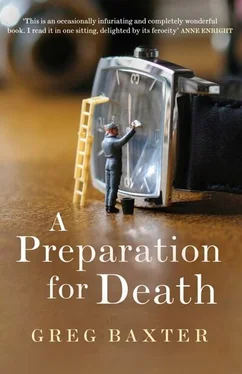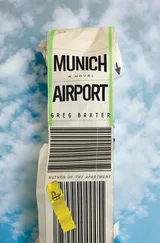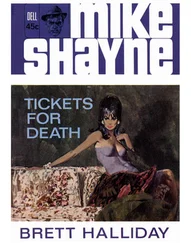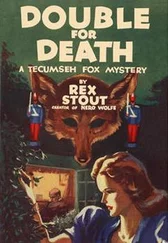Reading the section in Wittgenstein on his association of fat with Wednesday and thin with Tuesday, I realized that I associate all my memories of Vienna with the colour blue. In fact, I have painted blue into my description of the city, even when it does not exist. The light outside my window, for example, is absolutely white; I imagined the blue. Yet without the association, the memory is ungraspable. No other colour works. If I think green at the same time I think Vienna , I can think of specific green things: the roofs of some buildings, especially the Jugendstil underground stations, or the gardens I have visited. But if I think blue , my mind floods over the image of the city all at once — main streets and alleyways, tall buildings in fog, music, packed nightclubs, Walter, drag shows, Onka, eating Käsekrainer on the street.
I have discovered that if you want to see the most beautiful women in Vienna — and there are beautiful women everywhere — one thing to do is take the U4 from Schwedenplatz to Hietzing at rush hour. There are probably a handful of other stretches of underground they move in, but this one is the one I know. I put my headphones on and blast my new Prokofiev — for instance — and stand at one end of a railcar, and look upon them. This is prurience, but also, and more so, awe, admiration, pain. Then I come home and cook Walter some dinner, so he can relax and recuperate. He is deteriorating, and never smiles. Some nights I return to the city, and some nights I stay in and listen to music — there are very few CDs left to copy.
Living in a kind of interdependence with Walter, recording my days as if they mattered, going to concerts in the cheap seats, smoking two packs of cigarettes a day, drinking anonymously, slowly assembling an identity in German — my time here is an imperfect glance at a life I will never know. My time here dissipates. It seeps through a drain. The thought of work again, of small-mindedness, of the manufactured emergency of news — I don’t know how I am supposed to go back to that. When Clare was here, on the first night, she began to describe the state of mind at home, the panic of financial meltdown, loss of jobs everywhere, how dismal and unhappy life had become. It had been more than three weeks since I’d read a single line of news about Ireland, or anywhere else, and I had to ask her to stop. She wanted to stop, she said she could not bear to go on about it, but the news had its teeth in her. Few people really understand how the news is made; if they did, they would never pick up a newspaper again. After four days here, everything that she had worried about seemed less important than the act of eating a nice breakfast, or a night out at the symphony.
I quit Wittgenstein for a while and bought Henry Miller in German — Der Wendekreis des Krebses , a title not quite as romantic as Tropic of Cancer . I have read the book enough times to understand the gist, even when the words are out of reach. Walter also has a copy of the book in English, which I gave him in 2002, to mark our time here. I read and write down words I know I want to know: Ungeheuer (monster), Unflat (squalor), krumm (lopsided), uneben (uneven), blinzeln (blink), and Dirnen (trollops). Miller somehow does not suit Vienna. Wittgenstein is blue; Miller is another colour. The words in Wittgenstein have a diminishing effect on me, a vanishing effect. Miller electrifies. He vomits. Then there is Handke, who suffers, who hates Austria. I try to let each vocabulary exist at the same pitch, and interweave them, so that I am always disappearing and trembling and desiring and suffering and hating. I accumulate the language of essence only. Yet all this has started to bore me, since I feel that existing in this way is something I have already accomplished, and may not be an end. I have grown weary with the weight of language, and it only makes me more of myself. The only thing that seems different now — different enough to justify so many weeks in Vienna — is my interest in music, which I play not as background noise while I read or eat or tidy up my room, but without distraction, loudly, as loudly as Walter’s speakers will play it, sitting very still, or lying down, or on my headphones in the city: I am perfecting the art of strolling around, watching the city unfold by alleyways, the slow and rolling film of altering perspective — to music; music that suits this city more than any other.
The book is finished. This is just an exhale, a lingering glance, an experiment in superfluousness. I have always dreamed of a book with a last chapter that was unnecessary, that went on too long, that took place somewhere else, with other people, and left the old story to flap about in the breeze. I am not in search of a self. I am leaving one behind. I plan to cast the self who came here into oblivion — the author of this book, who has nothing more to say. I leave it here, in the cold, in this record, which is the sum of my experiences in the city, so that it may prowl around as long as it likes, sit and talk with Walter in his apartment for eternity. This morning I woke a little later than usual. Walter had gone to his physiotherapy. I washed the dishes that were left over from the night before and turned on some music — Maria Callas singing Verdi, Puccini, Rossini. I took a bath — I have not mentioned that I am starting to take baths now. I made a cup of green tea, which helps settle my stomach, and sat in the living room for a very long time, without movement, and watched the smoke from my cigarette settle in the still air of the room. The self I shall leave behind will be doing this forever.
The desk in my room has become cluttered with remembrances — programmes from concerts, exhibits, receipts, unfolded clothes, and my books: I have now officially given up reading, and I feel reborn because of it. Dieter and Heidi gave me a picture of Herbert, which I have leaned against one of the twenty potted plants. Our eyes are still alike — according to Clare — but the uncanny similarity has vanished. My face has broadened a little and I look like Octavian now — though who knows what Herbert would have looked like if he had reached my age? I have also learned that he did not die in Carinthia, as I remembered Maria telling me, but in Southern Tyrol, which is now a part of Italy. I can’t sleep late: the mornings have been sunny recently, and the light ignites the room, and slowly I begin to boil under the duvet. I throw it off. I lie on my back, play music, and stare at the haze — the absolute stillness of everything. If there is any water left in my glass, I finish it. I check the time on my phone. It is always earlier than I wish.
The other evening, I met an old friend named Michi. He’s a politician — a socialist — in Wiener Neustadt, a little town about forty-five minutes by train to the south. We first met in 1995, when I was living in Germany. He was the boyfriend of an Austrian girl I knew from Texas. He spent a few days showing me around, talking about the possibility of a just and equitable society, and denouncing greed and unnecessary wealth. He is very small, which somehow suits the intensity with which he speaks about injustice. We met again in 2002, and I spent a night with him and a bunch of historians, politicians and intellectuals in Wiener Neustadt. I remember a room full of wild hair and huge beards dripping with beer suds. At the time he was starting his own publishing house, a non-profit venture that would publish books nobody else would — local history, political dissertations, and so on. It is flourishing now, and he, alone, has written something like a dozen books for it. They never make any money, and everyone works for free.
We met in Café Westend, which is at the top of the Innere Mariahilferstrasse, and would have had a view of the city’s main train station, Westbahnhof, if it weren’t concealed in a building site. The café was large, pleasantly run-down, and sparely decorated. Michi waved from his booth. He wears nothing but black — black trousers, black shoes, black shirt, and black suit jacket, even in summer. I had forgotten that, and I felt a little stupid in my blue shirt, jeans, and hiking boots. We shook hands and sat down and he ordered me a beer. His life had gone largely unchanged since we last saw one another, except that he had married his long-term girlfriend, so I spent the first half-hour catching him up on mine. He scratched his head afterwards. Crazy, he said.
Читать дальше












